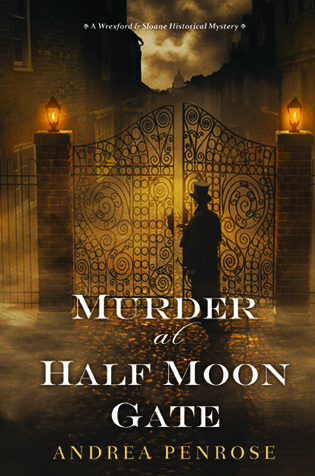
Murder at Half Moon Gate
Book Two—The Wrexford & Sloane Series

A wealthy lord who happens to be a brilliant scientist . . .
An enigmatic young widow who secretly pens satirical cartoons . . .
A violent killing disguised as a robbery . . .
Nothing is as it seems in Regency London, especially when the Earl of Wrexford and Charlotte Sloane
join forces to solve a shocking murder.
When Lord Wrexford discovers the body of a gifted inventor in a dark London store alley, he promptly alerts the watchman and lets the authorities handle the matter. But Wrexford soon finds himself drawn into the murder investigation when the inventor’s widow begs for his assistance, claiming the crime was not a random robbery. It seems her husband’s designs for a revolutionary good steam-powered engine went missing the night of his death. The plans could be worth a fortune . . . and very dangerous in the wrong hands.
Joining Wrexford in his investigation is Charlotte Sloane, who uses the pseudonym A. J. Quill to publish her scathing political cartoons. Her extensive network of informants is critical for her work, but she doesn’t mind tapping that same web of spies to track down an elusive killer. Each suspect—from ambitious assistants to rich investors, and even the inventor’s widow—is entwined in a maze of secrets and lies that leads Wrexford and Sloane down London’s most perilous stews and darkest alleyways.
With danger lurking at every turn, the potent combination of Wrexford’s analytical mind and Sloane’s exacting intuition begins to unravel the twisted motivations behind the inventor’s death. But they are up against a cunning and deadly foe—a killer ready to strike again before they can recover the inventor’s priceless designs . . .
EXCERPT
Charlotte quickly finished sorting through the box of Anthony’s clothing and returned to the main room.
“Raven,” she said, after scribbling a short missive and folding the paper. “Would you and Hawk kindly take a note to Mr. Henning?” The surgeon ran a clinic for wounded war veterans. She was sure that a donation of clothing would be most welcome.
The boys looked up from their schoolbooks—too quickly, she thought with an inward sigh. With all the distractions of readying for the move, they had been neglecting their studies.
“Aye, of course, m’lady!” said Raven, shooting up from his stool.
And we’d be happy te run any other errand for you,” added Hawk hopefully.
“Thank you, but the note may wait until after you have finished the chapter on the Glorious Revolution.”
“History’s boring,” grumbled Raven, reluctantly sitting down.
“Actually it’s not,” she countered. “It’s all about the fascinating people—the politicians, the philosophers, the artists, the soldiers, the musicians—who shape the world.”
Hawk looked thoughtful. “William of Orange does seem a like wery interesting fellow.”
“William—now there’s a good, strong name.” Charlotte seized the opportunity to change the subject. It was a sore point between them, but much as she disliked pressing the boys, it couldn’t be put off much longer. A decision had to be made.
Raven muttered a word she pretended not to hear. “I don’t want a new name.” His chin took on a pugnacious tilt. “Wot’s wrong with the one I have?”
They had been over that question countless times during the past week. The new neighborhood was only a scant half mile away. But it was a different world from the stews of St. Giles. To fit in, the boys needed real names.
“Think of it this way,” she reasoned. “Life is all about change—a caterpillar turns into a colorful butterfly. You are simply shedding your old skin and taking on a new one. It will be . . .”
A loud knock on the front door saved her from having to utter yet another platitude.
“That must be the carter.” Charlotte hurried through the entryway and threw back the bolt.
“You’re late,” she chided as the portal swung open.
“Am I?”
The Earl of Wrexford was wearing a superbly tailored coat, a rakish low-crown beaver hat—and his usual sardonic smile, noted Charlotte.
“That should be of no surprise,” he went on, stepping past her without waiting for an invitation to enter. “You know conventional manners bore me to perdition.”
“Indeed I do. So I take it this isn’t a social call?” she replied with a harried sigh. It had been a fortnight since his last visit, and the unexpected appearance caused a tiny hitch in her heartbeat—though she was too preoccupied to think about why.
Ignoring her question, Wrexford took off his hat and ran a hand through his wind-ruffled dark hair. It looked like it hadn’t been trimmed in weeks.
“Halloo, Weasels,” he called to the boys.
“You see, m’lady,” challenged Raven. “His Lordship doesn’t give a rat’s arse about calling us by a heathen moniker.”
Charlotte bit her lip in exasperation. Given the earl’s penchant for sarcasm, this was not likely to end well.
“I seem to have intruded on some sort of altercation,” he murmured. “Pray tell, what’s the problem?”
“Never mind,” she said through gritted teeth.
He arched a brow.
“She wants us te have proper English names,” volunteered Hawk. “So when we move te a new neighborhood no one will know we’re nuffink but orphan guttersnipes.”
“It’s bloody stupid and I won’t do it!” cried Raven hotly. “I refuse te be a Charles or a Nathaniel—or any other cursedly idiotic name.”
“Merde,” muttered Charlotte and then tried another tactic. “Come, there must be some choice that doesn’t make your skin crawl.”
Raven’s expression turned even more mulish.
“Ye god,” murmured the earl. “All this sturm und drang, when the answer is laughably simply.”
She fixed him with a look of mute appeal. “Please, sir, this isn’t a game.”
“Allow me to explain,” he replied.
She hesitated, and then gave a brusque nod. So far, all her arguments had been for naught. There was little to lose.
Wrexford turned to Raven. “Pick a proper Christian name—any choice will suffice.”
“But—”
“Just do it, lad.” A note of command edged his voice.
The boy drew in a wary breath. “What was yer brother’s name—the one who’s dead?”
“Thomas,” answered the earl softly.
“Then I choose Thomas.”
“Excellent.” Wrexford performed an elaborate formal flourish.
Drat the man—he was clearly enjoying himself, though Charlotte. At my expense.
His deep, plummy voice drew her back from her momentary brooding. “Allow me to present Thomas Ravenwood Sloane—known to all as Raven.”
Charlotte started to speak but he waved her to silence. “In the beau monde, men are very rarely called by their Christian name. It’s a time-honored tradition that you acquire a nickname. I am always called Wrex, John Nottingham Allerton is Notty . . .”
The earl shrugged. “So there you have it—two birds with one stone, if you will. The lads need only mention their full names once, and then never have to deal with the question again. While you have what you need for any official purposes.”
“Yeah, I s’ppose I can live with that,” allowed Raven.
“But I—” she began.
“If you are concerned about the choice of Sloane as a surname, my thought was, you can explain the lads are orphaned relatives from your late husband’s side of the family. Again, it seems the simplest solution, but it is entirely up to you if you wish to choose another.”
She drew in an uncertain breath. “No, what you suggest makes sense.”
“Excellent.” Wrexford shifted his gaze to Hawk. “Your turn.”
“Wot’s your Christian name, sir?”
The question seemed to take him by surprise. Charlotte realized that she, too, had no idea of the answer.
“I can’t remember,” quipped Wrexford.
“Come, sir, what’s good for the goose is good for the gander,” she murmured.
He frowned in mock concentration for a long moment. “I believe it’s Alexander. But I ought to check Debrett’s Peerage to confirm it. It may be Agamemnon or Aloysius.”
Raven snickered.
“I choose Alexander,” said Hawk solemnly.
Another flourish. “And here we have Alexander Hawksley Sloane—known to all as Hawk.”
“Alexander Hawksley Sloane,” repeated Hawk in an awestruck whisper. A delighted smile spread the width of his narrow face.
“It’s an awfully big handle for an awfully small runt,” teased his brother.
Although the older boy was very good at hiding his emotions, Charlotte could sense that he was secretly just as pleased.
“Thank you, milord,” she murmured.
Hawk took up a pencil and began to write out his new name in large, curling copperplate script letters.
“I see that no more serious study can be expected,” observed Charlotte wryly. “So you two might as well take your swift feet—and exalted monikers—and fly off to Mr. Henning with my note. Lord Wrexford and I have some private matters to discuss.”
****
“How do you know that?” inquired Wrexford, as he watched the boys gratefully snap their books shut and scamper for the door.
“Because, as you’ve take pains to point out, you despise social pleasantries. You’re a pragmatic man, milord. So since you are here, I assume there’s some sordid matter in which my skills or my knowledge can be of use to you.”
Was he really that unfeeling to his friends? Sheffield’s oblique criticism suddenly cut a little more sharply against his conscience. Despite the complexities that shaded their relationship, he did think of Charlotte as a friend.
“Perhaps I have come to wish you well in your new residence.”
She let out a low laugh. “And perhaps pigs have learned how to fly.”
Some men might have been offended. However, he liked to think hypocrisy was not one of his many faults.
“I may always count on you to bring my vanity down to earth,” he murmured.
Charlotte turned away and began straightening up the jumble of books and papers on the table. “It was merely an empirical observation, not a criticism. We both know you despise tender sentiments.” Her hands stilled on the paper bearing Hawk’s carefully written name. “That said, I’m truly grateful to you, sir. Your solution resolved a very thorny problem.”
“
As we both know, seeing a problem from a different perspective often reveals a simple answer.”
More shuffling. Charlotte shifted her stance, and in the flickering of the shadows, he thought he detected a look of uncertainty pinch at her features. However, it was gone in a flash as she looked up and tucked a loose strand of hair behind her ear.
A thin smile twitched on her lips. “Which, I take it, is why you are here.”
Wrexford allowed an answering smile. “Close enough to the truth that I won’t quibble over semantics.”
She sighed and signaled for him to have a seat on one of the stools. “Why is it that I suspect this concerns last night’s murder?”
“Because you have very good instincts.”
“I thought you told the lads it was merely a falling out among criminals.”
“And so I believed at the time,” he replied.
She sat down opposite him, her expression unreadable. “Go on.” . . . . .
To purchase, click on one of the links below:
